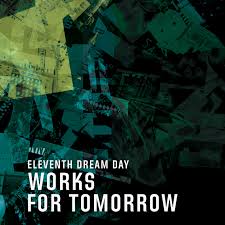Hop in the time machine, manipulate the dials, teleport yourself back to 1985 and tell expectant citizens of the era that some of their young, thrusting, larvae-like independent rock bands are going to exist for another thirty years. The idea would likely frazzle their noggins, wouldn’t it? Thirty years before that, the "rock band" as we think of it today hadn’t even been invented. Any prototypical bands shameless enough to still hang around in 1985 were de facto dinosaurs, so why not compound your befuddling by informing the 80s that The Rolling Stones will, in 2015, continue to exist, and make mindboggling amounts of money every time they deign to tour? At which point they will surely be weeping bloody tears for their children’s future.
Thirty years ago, Chicago’s Eleventh Dream Day also released their first song, on a local radio station compilation LP. Still going without any sort of breakup in the middle, by my counting Works For Tomorrow is their eleventh LP, although this does involve treating an album called Eighth as their seventh. They’ve never moved enough units for it to explain their endurance (a few years on a major label yielded some great music, but no real commercial breakthrough) and, since the turn of the century, have taken leisurely breaks between albums. In short, they’re a band who’ve benefitted from indie rock becoming codified, in that it’s allowed them to continue into middle age without this being seen as some sort of betrayal of the genre’s ethos. (Aside: just about everyone who spent their early career trumpeting the innate power of youth – Calvin Johnson, Ian Svenonius, the Manics, Kathleen Hanna – has displayed a strange reluctance to wind down, despite being comfortably into their forties.)
Works For Tomorrow is a broadly terrific album which, at the risk of projecting, sounds like the result of a cumulative century-plus honing their musicianly styles. Currently a quintet, the three members who’ve been there from the start – Rick Rizzo, Janet Beveridge Bean and Doug McCombs – each bring the influence of their other projects to latter-day EDD. Rizzo is a magnificent guitarist with a strong experimental streak that’s seen him play with the likes of Loren Connors in the past; his ranginess and approach compares to Neil Young or Tom Verlaine, but he’s one of those dudes who I could listen to all day just for the guitar tone (if they wanted to play some actual songs, that’s a bonus). ‘Cheap Gasoline’, this album’s third track, is a stolid chugathon oddly and distinctly similar to ‘Rocks’ by Primal Scream – until Rizzo transforms proceedings with some liquid soloing. ‘Go Tell It’ is even better, exemplary Roman road rock that’s equal parts Grand Funk and Velvet Underground; the electric piano of James Elkington, EDD’s newest member, plays a big part in this one’s belter status too.
If Works… isn’t quite an album of two halves, pretty much all of its quieter moments arrive in the last 20 minutes. Hard as they can rock when prompted, melancholy and sparseness are abundant in Eleventh Dream Day’s arrangements. Bean, the band’s drummer, and bassist McCombs have each recorded several albums with – respectively – impeccably glum country group Freakwater and jazz/rock polymaths Tortoise. Echoes of both can be found here: the plangent basslines of ‘Deep Lakes’ could slot onto a Tortoise album like TNT. Bean and Rizzo duet on ‘The Unknowing’, which progresses from a cymbal-tapping exercise in tension to a pensive country-rocker with whirring organ and a hint of heartland.
Before all that, however, EDD have already verified their continued vitality – not that they ought to require the approval of reviews to carry on – with multiple bursts of punky vim. "I’m gonna take it from the inside / I’m gonna take it SLOW," hollers Bean repeatedly on ‘Vanishing Point’, the album’s opening song; no other lyrics are forthcoming, because why get fussy when you’ve located a great, nonsensical rock & roll turn of phrase? The title track is about as direct as they’ve ever been, sounds a bit like The Wipers, and finds Bean removing every vestige of subtlety from her drumming, in a good way.
I’m not sure if the Eleventh Dream Day fan community runs deep enough for there to be any understood consensus on how their albums ought to be ranked. For me, this might be their most enjoyable release since 1991’s Lived To Tell – one of their major label efforts, but scarcely attempting to polish itself up for whoever the fresh new audience was supposed to be. It’s an essentially rockist experience, but never sounds like it’s resting on the laurels of the form, and in Rizzo’s case especially, throbs with a clear love for the eternal gnarl of the electric guitar. When I listen to Works For Tomorrow, I hear an album that could get clasped to the bosom of dadrock types, alt.country stalwarts and the people who’ve purchased the candied dreampop of Beach House in their droves. Maybe, though, there isn’t enough of any of those modes in an Eleventh Dream Day album to please those folks. Still, if they were that fussed about it, they probably wouldn’t have been keeping at it for thirty years.
<div class="fb-comments" data-href="http://thequietus.com/articles/18405-eleventh-dream-day-works-for-tomorrow-review” data-width="550">


